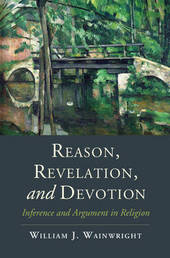
|
Reason, Revelation, and Devotion: Inference and Argument in Religion
Hardback
Main Details
| Title |
Reason, Revelation, and Devotion: Inference and Argument in Religion
|
| Authors and Contributors |
By (author) William J. Wainwright
|
| Series | Cambridge Studies in Religion, Philosophy, and Society |
|---|
| Physical Properties |
| Format:Hardback | | Pages:216 | | Dimensions(mm): Height 235,Width 156 |
|
| Category/Genre | Philosophy of religion
History of religion |
|---|
| ISBN/Barcode |
9781107062405
|
| Classifications | Dewey:210 |
|---|
| Audience | | Tertiary Education (US: College) | | Professional & Vocational | |
|---|
|
Publishing Details |
| Publisher |
Cambridge University Press
|
| Imprint |
Cambridge University Press
|
| Publication Date |
1 December 2015 |
| Publication Country |
United Kingdom
|
Description
Reason, Revelation, and Devotion argues that immersion in religious reading traditions and their associated spiritual practices significantly shapes our emotions, desires, intuitions, and volitional commitments; these in turn affect our construction and assessments of arguments for religious conclusions. But far from distorting the reasoning process, these emotions and volitional and cognitive dispositions can be essential for sound reasoning on religious and other value-laden subject matters. And so western philosophy must rethink its traditional antagonism toward rhetoric. The book concludes with discussions of the implications of the earlier chapters for the relation between reason and revelation, and for the role that the concept of mystery should play in philosophy in general, and in the philosophy of religion and philosophical theology in particular.
Author Biography
William J. Wainwright is Distinguished Professor of Philosophy Emeritus at the University of Wisconsin, Milwaukee. He has served as Editor of Faith and Philosophy and is past President of both the Society for Philosophy of Religion and the Society of Christian Philosophers. Major publications include Mysticism (1981), Philosophy of Religion (1998, 2nd edition 1999), Reason and the Heart (1995), Religion and Morality (2005), and the edited volume Oxford Handbook of Philosophy of Religion (2005), as well as over eighty articles and book chapters.
Reviews'William J. Wainwright has always been a person who philosophizes with his whole self. Little wonder, then if ... he tries to show us how reasoning about what matters most is and ought to be existentially embedded. No surprise, when he makes his cross-cultural case that rational conviction depends not only on logical acumen but on disciplined passions and habits of the heart.' Marilyn McCord Adams, University of Oxford 'William J. Wainwright's thought and writing, like [those] of all good philosophers, [are] careful, precise, and elegant. This collection ... shows the importance of attending to the passional aspects of reasoning, and [the] difference that context makes to the success of argument. It's an important and beautiful book; it should be widely read.' Paul Griffiths, Duke Divinity School 'Wainwright seeks to explain why argument and inference in matters religious typically fail to be universally persuasive ... Written in lucid, accessible prose and drawing on prodigious scholarship, including a deep knowledge of Hindu and Buddhist as well as Christian and Jewish sources, this is a major contribution to the self-understanding of both philosophy and theology.' Merold Westphal, Distinguished Professor of Philosophy Emeritus, Fordham University 'Wainwright's book is a game-changer ... No longer should analytic philosophers be able to ignore, to the degree they do, Eastern religions. [This is] required reading for philosophers of religion.' Jerome Gellman, Ben-Gurion University of the Negev 'By probing the importance of religious practice (scriptural ingestion, mystical insight, the apprehension of mystery) and of the structural significance of passion and rhetoric in religious argumentation, Wainwright reveals once more his own distinctive depths of spiritual insight as well as his accustomed philosophical clarity. This is an important, timely, and elegant monograph [that] deserve[s] wide discussion.' Sarah Coakley, Norris-Hulse Professor of Divinity, University of Cambridge '... this is an important and valuable book for those working at the intersection of philosophy, religious studies, and theology.' Robert MacSwain, Reading Religion
|